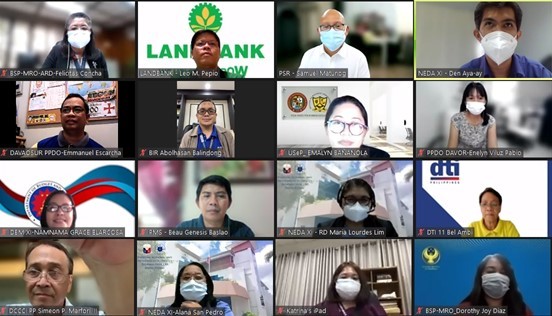
The Macroeconomy and Finance Committee (MFC) XI conducted its 3rd quarter CY 2021 meeting on September 7, 2021 via Zoom, which was presided by Regional Development Council (RDC) XI Private Sector Representative (PSR) for Information and Communication Technology (ICT) and MFC XI Chairperson Atty. Samuel R. Matunog.
During the meeting, Mr. Rosendo M. Aya-ay of the National Economic and Development Authority (NEDA) Regional Office XI presented to the Committee the various issues on the implementation of Republic Act No. 10000 or the Agri-Agra Reform Credit Act of 2009, as well as the recommended amendments to the said law. Inputs from the Agricultural Credit Policy Council (ACPC), Bangko Sentral ng Pilipinas (BSP), Department of Agrarian Reform (DAR), Small Business Corporation (SBCorp), and the Government Financial Institutions (GFIs), were integrated in the recommended policy review of the Agri-Agra Law. Among the issues cited are the undercompliance of banks, especially the commercial and thrift banks, to the 10 percent agrarian credit and the 15 percent general agricultural credit and the limited educational background and financial literacy of the Small Farmers and Fisherfolks (SFFs). The undercompliance of the banks are attributed to their hesitancy in agricultural lending due to the sector’s vulnerability to natural calamities, high input/production costs and low profitability. Some of the recommended enhancements were the removal of the distinction between the mandatory compliance of lending 15 percent for agriculture and 10 percent for agrarian reform beneficiaries (ARBs) in the banks’ portfolio, broadening the list of loan beneficiaries and activities that can be financed through bank loans or investments, as well as the alternative modes of compliance. It was also proposed to create a Special Fund and an Agricultural and Fisheries Finance and Capacity Building Council (AFFCC) to fund and handle the conduct of capacity building programs of the loan beneficiaries. After a long discussion, the Committee agreed to request more inputs from private banking institutions and Local Government Units for the policy review of the Agri-Agra Law before recommending its position.
In the same meeting, Mr. Heracleo M. Pepio of the Landbank of the Philippines (LBP) Davao Lending Center presented to the Committee the various LBP financial credit programs for the marginalized sectors, which include the Agricultural Competitiveness Enhancement Fund (ACEF) for farmers, fisherfolk and agricultural Micro, Small and Medium Enterprises (MSMEs), Accessible Funds for Delivery to ARBs Program (AFFORD-ARBs) for agrarian reform beneficiaries, Expanded Rice Credit Assistance under Rice Competitiveness Enhancement Fund (ERCA-RCEF) and Survival and Recovery Assistance (SURE) Aid Program for rice farmers and farmworkers, and the Socialized Credit Program under the Sugarcane Industry Development Act (SCP-SIDA) for sugarcane farmers and cooperatives. The LBP also implements a lending program for former rebels to complement the government’s Enhanced Comprehensive Local Integration Program (E-CLIP). This program will enable former rebels to put up small businesses and agri-enterprises as they are integrated back into society.
-Pamela N. Yparraguirre, NEDA XI
